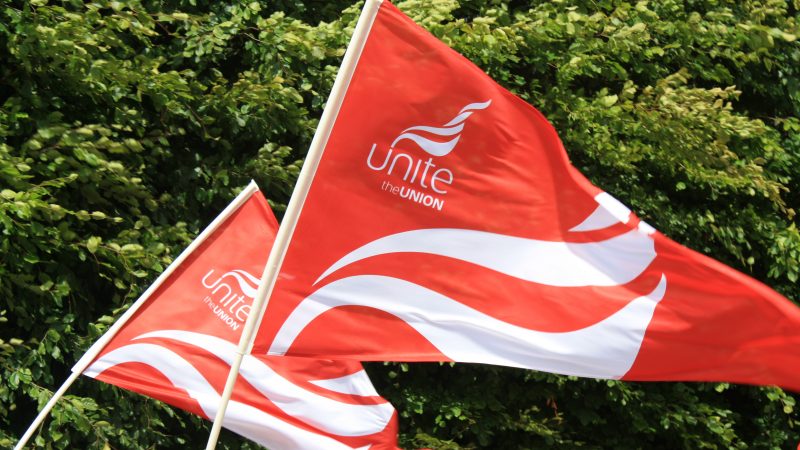
Unite’s general secretary election is coming to an end. Monday 23rd August is the deadline for votes to be returned to the independent scrutineer, with the result set to be announced on the 26th, but voters must send in their ballot papers by midday on the 18th to arrive in time. Unite members who have not yet sent off their choice in a return envelope do not have long left to help determine the leadership of one of the UK’s largest unions and Labour’s biggest affiliate.
Steve Turner, the assistant general secretary for manufacturing backed by outgoing general secretary Len McCluskey, is widely seen as the frontrunner in the race based on branch nominations: he received 525, compared to Sharon Graham’s 349 and 196 for Gerard Coyne. Turner is also expected to have secured more support since then, as Howard Beckett, who won 328 nominations, soon after pulled out and endorsed him.
In the final, crucial days of the contest, Turner has joined striking Rolls-Royce members on the picket line in what is dubbed ‘the battle for Barnoldswick two’ and voiced support for GKN workers in Birmingham now being balloted for strike action. With Unite, he has urged the government to adapt, rather than dump, the furlough scheme, and as co-chair of Labour Assembly Against Austerity has criticised the upcoming Universal Credit cut. Earlier in the campaign, he released a ‘workers’ greenprint for a million jobs’.
Gerard Coyne, supported by many backers of Keir Starmer, has been focused on turnout, with lots of promoted social media posts and a “direct contact blitz”. Over the weekend, he emphasised his wish for Labour to be a “credible electoral force with sensible policies and reliable support from its affiliates” and reiterated his criticisms of the current Unite leadership. Coyne has made clear his aim: “to find every member who has a ballot paper behind their mantlepiece clock, or in their pile of unopened mail, and ask them to urgently cast their vote for change”.
Coyne has promised Unite members “greater transparency, better value for their subs, and more support through a £10m skills fund”, as well as a “laser-like focus on jobs, pay and conditions”. On labour issues that might interest members, he has expressed support for a new ‘right to disconnect’, saying an ‘always on’ culture especially affects those working from home, and also pledged to fight for remote working rights, saying employers “should have to show why it’s not viable for the business” before refusing such requests.
Sharon Graham, the “workers’ candidate” who would be the union’s first female general secretary if elected, hit back over the weekend after the Daily Mail published a story accusing her of “‘bully-boy’ tactics”. The paper alleged that her Unite department had planned to “target” the family of British billionaire Sir Jim Ratcliffe. “Oh dear – I hear the boys are getting worried. Now leaking stories that I’m too hard on bad employers,” Graham tweeted. “I make no apologies for defending workers. That is the job of a union.”
During the election, like Coyne, Graham has argued: “I believe that we have moved too far from our core business – protecting jobs and improving the pay and conditions of our members.” The candidate with already strong relationships with union reps has made efforts to appeal to Unite’s retired section with the proposal of a £10m state pension campaign fighting fund. She has also warned that “home working done badly” can lead to “more work for the same pay” and women being “cut out” of promotions.
When August 26th arrives with the result, whatever it is, the impact will be meaningful. That does not mean any changes would be immediate and obvious, even if Coyne were successful: Unite’s executive council will be dominated by the left faction for the foreseeable future, and Unite delegates to Labour conference 2021 have already been chosen (and they decide as a delegation how to vote). But it will be a hugely significant result, for both the union and the Labour Party, whoever wins.




More from LabourList
‘Labour’s quiet quest for democratic renewal’
‘Labour promised to make work pay. Now it must deliver for young people’
‘Council Tax shouldn’t punish those who have the least or those we owe the most’